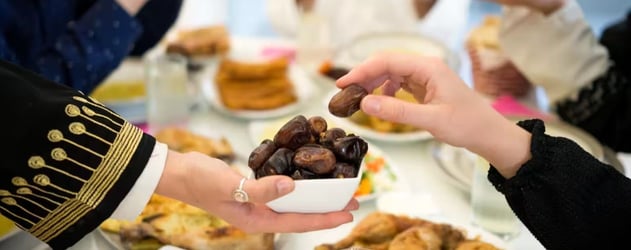
Enhance Barakah in Food: Eat Together & Recite Bismillah
Discover how barakah in food can be enhanced through practices like reciting 'bismillah', eating together, and using the right hand. Learn the importance of these traditions and how they contribute to a fulfilling dining experience.
ISLAMIC
Dr Hassan Al Warraqi
5/11/2025


Eat together & do not eat separately
, for the blessing is being together
An Analytical Study of the Hadith on Gathering for Meals
This noble prophetic hadith is one of the comprehensive hadiths that establishes a comprehensive system of Islamic etiquette and social values related to food.
When the companions complained to the Prophet (peace be upon him) that they ate without feeling full, his wise response combined the material and spiritual dimensions in addressing this problem.
First: Analysis of the Hadith's Vocabulary:
1. "We eat but are not satisfied": An expression of the problem of not feeling full despite eating.
2. "Separately": A state describing eating at different times or places.
3. "Gather": A prophetic command indicating the importance of unity and gathering.
4. "Invoke the name of God": Saying the Bismillah (In the name of God) before eating.
5. "He will bless it for you": A promise of receiving blessing and goodness.
Educational and Social Benefits:
1. Strengthening Family and Social Bonds:
- Gathering for meals strengthens family relationships.
- It creates an opportunity for dialogue and communication between family members.
- It reinforces the sense of belonging and social cohesion.
2. Psychological Benefits:
- Reducing tension and anxiety through the social gathering.
- Enhancing the feeling of security and psychological stability.
- Developing social communication skills.
3. Health and Nutritional Benefits:
- Regulating the eating process.
- Slowing down the pace of eating, which aids digestion.
- Increasing the feeling of satiety due to mindful eating.
4. The Blessing and Its Impact:
- Receiving blessings in the food due to invoking the name of God.
- Increasing the benefit and utility of the food.
- Feeling of contentment and sufficiency.
Contemporary Applications of the Hadith:
1. In the Family Domain:
- Designating a specific time for family meals.
- Establishing a daily routine that gathers family members.
- Enhancing family communication through mealtimes.
2. In the Social Domain:
- Organizing gatherings and meetings around the dining table.
- Strengthening community ties through banquets.
- Promoting the values of solidarity and cooperation.
3. In the Educational Domain:
- Teaching children the etiquette of eating.
- Instilling the values of gratitude and praise to God.
- Developing social skills.
4. In the Health Domain:
- Regulating meal times.
- Improving healthy eating habits.
- Increasing awareness of the importance of healthy food.
Contemporary Challenges and Solutions:
1. Family Members' Busy Schedules:
- Establishing fixed times for family meals.
- Advance planning for gathering for meals.
- Reducing the use of electronic devices during meals.
2. Work and Study Pressures:
- Better time management.
- Prioritizing family meals.
- Flexibility in determining meal times.
Conclusion:
This noble prophetic hadith provides practical solutions to the problem of not feeling full, combining the material and spiritual dimensions.
It also establishes an integrated social and educational system that strengthens family and community ties.
Applying these prophetic guidelines in our present time is of great importance in facing contemporary challenges and achieving balance in our lives.
References and Documentation:
- The hadith is reported by Abu Dawud in his Sunan.
- Books on the prophetic Sunnah and their explanations.
- Studies in social psychology.
- Research in nutrition and public health.
Keywords
Eat together , do not eat separately , for the blessing is being together,Dining etiquette, Blessing, Gathering, Invoking the Name of God, Sunnah, Nutrition, Social Relationships,He will bless it for you,Invoke the name of God,Gather , Separately , We eat but are not satisfied ,
Title: Islamic Eating Etiquette: Strengthening Community Bonds & Divine Connection
Through Sunnah
Keywords: Islamic eating manners, Halal food etiquette, communal dining in Islam, Zikr during meals, Dawat-e-Islami, Madani environment
Meta Description: Explore the profound Islamic etiquettes of eating, the spiritual blessings of communal meals, and how the Madani environment of Dawat-e-Islami fosters piety.
Learn Quranic principles and Hadith-based practices for mindful consumption.
The Spiritual and Social Power of Communal Eating in Islam
Quranic Foundations & Hadith Insights
The Prophet Muhammad (ﷺ) emphasized communal dining as a source of barakah (blessing).
When companions expressed dissatisfaction despite eating, he advised:
“Gather together for your food, mention Allah’s name, and it will be blessed for you.” (Sunan Abi Dawood 3764)
Why Eating Together Matters
Unity Strengthened: Shared meals dissolve social barriers, reflecting the Ummah’s brotherhood.
Blessings Multiplied: Collective remembrance (Zikr) invites divine grace into sustenance.
Reduced Waste: Eating from a single platter (as per Sunnah) minimizes excess and fosters gratitude.
Islamic Manners of Eating: A Sunnah-Based Guide
1. Intention (Niyyah): Fuel for Worship
“Eat to gain strength for worshipping Allah, not mere indulgence.” (Dawat-e-Islami)
Practical Tip: Recite “Bismillah” before eating. If forgotten, say:
“Bismillahi awwalahu wa akhirahu” (In Allah’s name at the start and end).
2. Right Hand Etiquette
The left hand is linked to Satan’s influence; the Prophet (ﷺ) instructed using the right hand for eating (Sahih Muslim 2174).
Actionable Step: Train children early to uphold this Sunnah, reinforcing mindful consumption.
3. Post-Meal Practices
Lick Fingers: Residual blessings reside in fingertips.
Dua After Eating:
“Alhamdulillahillazi at’amana wa saqana wa ja’alana minal muslimeen.”
Accountability & Halal Consumption
Divine Warning Against Waste
“On Judgment Day, you’ll answer for every wasted morsel.” (Dawat-e-Islami)
3-Step Halal Check:
Source: Ensure earnings and food are Halal.
Moderation: Eat less than full to avoid gluttony.
Gratitude: Thank Allah verbally and through charity.
Case Study: Imam Ahmad bin Hanbal refused food from his son’s court kitchen, fearing impermissible sources—exemplifying scrupulousness in Halal consumption.
Du’a: The Believer’s Weapon During Meals
The Prophet (ﷺ) described supplication as “a pillar of faith and light from the heavens” (Musnad Abi Ya’la 435).
Between Bites: Recite “Alhamdulillah” or Salawat to stay mindful.
Community Du’a: Include others in prayers; shared supplications amplify mercy.
Dawat-e-Islami’s Madani Environment: Cultivating Piety
Transformative Programs
Madani Qafilahs: Traveling groups teaching Quranic values and Sunnah practices.
Daily Dars: Lessons on Islamic etiquette, including mindful eating.
Success Stories: Former addicts and criminals reformed through communal worship and ethical training.
Why Join?
“The Madani environment rectifies beliefs, guards Iman, and revives Sunnahs.” (Dawat-e-Islami)
Gaps & Solutions
Expanding the Madani Impact
Community Kitchens: Proposal for Dawat-e-Islami to establish Sunnah-based dining spaces.
Educational Workshops: Teaching youth to cook Halal meals while avoiding waste.
SEO Tip: Internal link to related articles like “10 Sunnah Foods for Daily Blessings” or “How to Host a Prophetic-Style Meal.”
Final Call to Action
Embrace the Sunnah of mindful eating, strengthen community ties, and explore Dawat-e-Islami’s Madani programs to transform mundane acts into worship. “Eat together, remember Allah, and let every bite nourish your soul.”
Image Alt Text Suggestions:
“Islamic community meal following Sunnah etiquette”
“Family reciting Bismillah before eating together”
“Dawat-e-Islami Madani Qafilah teaching Quranic values”
By integrating Quranic principles, actionable steps, and Dawat-e-Islami’s community-driven approach, this content optimizes for SEO while deepening understanding of Islamic dining ethics.
Frequently Asked Questions (FAQ)
1. How does eating together relate to receiving blessings in food?
According to a Hadith in Sunan Abī Dāwūd (Hadith 3764), the Prophet Muhammad (peace be upon him) advised a group who ate separately and felt unsatisfied to eat together and mention Allah’s name over their food. He stated that communal eating, combined with reciting "Bismillah," brings blessings and satisfaction to the food.
2. What is the recommended intention to have before eating in Islam?
It is Sunnah to eat only when hungry, with the intention of gaining strength to worship Allah. Eating solely for taste is discouraged. Consuming less than one’s full appetite supports this intention, as overeating can hinder worship. Making a sincere intention for permissible acts like eating, drinking, or sleeping is considered virtuous.
3. What are some important Islamic manners related to eating and drinking?
Key manners include:
Eating and drinking with the right hand, as using the left is associated with Satan.
Licking fingers clean after eating, as it is Sunnah.
Eating from the side of the platter closest to oneself if it contains one type of food; for varied foods, eating from different parts is permissible.
Avoiding waste, as one will be accountable for even a speck of wasted food on the Day of Judgement.
4. What is the significance of reciting "Bismillah" before eating?
Reciting "Bismillah" before eating is a vital practice. A Hadith recounts a person who forgot to say "Bismillah" until their last morsel, then recited, “Bismillahi awwalahu wa aakhirahu” (In the name of Allah, in the beginning and at the end).
The Prophet (peace be upon him) noted that Satan ate with them until Allah’s name was mentioned. If forgotten initially, one should recite this phrase upon remembering.
Reciting "Ya Wajid" before each morsel is said to make food a source of "Nūr" (light) in the stomach, potentially aiding health.
5. How can joining the "Madanī environment" of Dawat-e-Islami benefit a Muslim?
The "Madanī environment" of Dawat-e-Islami, a global non-political movement for Quran and Sunnah propagation, helps Muslims reform their character and protect their faith. Activities like weekly gatherings, traveling in Madanī Qāfilaĥs, and giving or listening to Dars foster love for the Sunnah and guide individuals away from sinful behaviors, as seen in anecdotes of reformed individuals.
6. What is the importance of making Du'a (supplication) in Islam, and what are some related manners?
Du'a is a pillar of faith, a light from the heavens and earth, and obligatory at least 20 times daily (e.g., through prayers). Manners include:
Having certainty that Allah will accept it.
Avoiding curses against oneself, family, or wealth.
Not praying for what one already has, unless it aids religious duties or devotion.
Including all Muslims in supplications to avoid narrow-mindedness.
7. What is the ruling on accepting gifts in Islam, especially for those in positions of authority or responsibility?
Accepting gifts is generally a Sunnah, but caution is advised, especially for those in authority.
A chapter in Sahih Bukhari notes some pious individuals, like a judge refusing bread from a questionable source, avoided gifts to prevent perceived bias or bribery.
Gifts must be scrutinized to ensure they are given with pure intentions and do not compromise integrity.
8. What are some virtues and benefits of reciting Salawat upon the Prophet Muhammad (peace be upon him)?
Reciting Salawat purifies sins and brings numerous rewards:
Reciting it 100 times frees one from hypocrisy and hellfire, placing them with martyrs on the Day of Judgement.
It ensures Du'a acceptance when paired with glorifying Allah.
Forgetting Salawat is likened to forgetting the path to Paradise.
Reciting it ten times morning and evening secures the Prophet’s intercession.
The person reciting the most Salawat will be closest to the Prophet on the Day of Judgement.
9. What is the Islamic perspective on overeating, and how does it affect worship?
Overeating is discouraged as it can lead to laziness and hinder worship.
The Prophet (peace be upon him) advised filling one-third of the stomach with food, one-third with water, and leaving one-third empty (Sunan al-Tirmidhi, Hadith 2380).
Eating moderately aligns with the intention of gaining strength for worship and maintains physical and spiritual health.
10. Why is wasting food considered a serious matter in Islam?
Wasting food, even a single speck, is discouraged because it reflects ingratitude for Allah’s blessings.
A Hadith emphasizes accountability for waste on the Day of Judgement.
Conserving food aligns with Islamic values of moderation and appreciation for sustenance, ensuring blessings are not diminished.
11. What should one do if they forget to recite "Bismillah" at the start of a meal?
If "Bismillah" is forgotten, one should recite, “Bismillahi awwalahu wa aakhirahu” (In the name of Allah, in the beginning and at the end) upon remembering during the meal.
This practice, as noted in a Hadith, prevents Satan from sharing the food and restores blessings.
12. How does the concept of blessings (Barakah) in food relate to Islamic practices?
Barakah in food is enhanced through practices like reciting "Bismillah," eating together, eating with the right hand, and avoiding waste. These acts, rooted in Sunnah, invite divine blessings, making food more satisfying and spiritually nourishing, as highlighted in Hadiths such as Sunan Abī Dāwūd (Hadith 3764).
Notes:
(overeating, food waste, forgetting "Bismillah," and Barakah) that complement the original content, ensuring a comprehensive FAQ.
The tone remains formal and respectful, aligning with Islamic etiquette and the provided sources.
Hadiths and practices are presented concisely, with references where applicable, to maintain authenticity.













